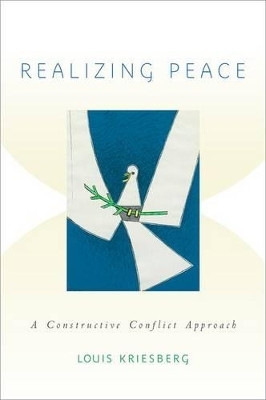
Realizing Peace
A Constructive Conflict Approach
Seiten
2015
Oxford University Press Inc (Verlag)
978-0-19-022867-5 (ISBN)
Oxford University Press Inc (Verlag)
978-0-19-022867-5 (ISBN)
In this book, author Louis Kriesberg draws on the constructive conflict approach to assess American involvements in foreign conflicts since the onset of the Cold War. He looks at what went well and what went poorly in order to derive ideas for engaging in conflicts more constructively in the future.
Early work in conflict resolution and peace research focused on why wars broke out, why they persisted, and why peace agreements failed to endure. Later research has focused on what actions and circumstances have actually averted destructive escalations, stopped the perpetuation of destructive conduct, produced a relatively good conflict transformation, or resulted in an enduring and relatively equitable relationship among former adversaries. This later research, which began in the 1950s, recognizes that conflict is inevitable and is often waged in the name of rectifying injustice. Additionally, it argues that damages can be minimized and gains maximized for various stakeholders in waging and settling conflicts. This theory, which is known as the constructive conflict approach, looks at how conflicts can be waged and resolved so they are broadly beneficial rather than mutually destructive.
In this book, Louis Kriesberg, one of the major figures in the school of constructive conflict, looks at every major foreign conflict episode in which the United States has been involved since the onset of the Cold War to analyze when American involvement in foreign conflicts has been relatively effective and beneficial and when it has not. In doing so he analyzes whether the US took constructive approaches to conflict and whether the approach yielded better consequences than more traditional coercive approaches. Realizing Peace helps readers interested in engaging or learning about foreign policy to better understand what has happened in past American involvement in foreign conflicts, to think freshly about better alternatives, and to act in support of more constructive strategies in the future.
Early work in conflict resolution and peace research focused on why wars broke out, why they persisted, and why peace agreements failed to endure. Later research has focused on what actions and circumstances have actually averted destructive escalations, stopped the perpetuation of destructive conduct, produced a relatively good conflict transformation, or resulted in an enduring and relatively equitable relationship among former adversaries. This later research, which began in the 1950s, recognizes that conflict is inevitable and is often waged in the name of rectifying injustice. Additionally, it argues that damages can be minimized and gains maximized for various stakeholders in waging and settling conflicts. This theory, which is known as the constructive conflict approach, looks at how conflicts can be waged and resolved so they are broadly beneficial rather than mutually destructive.
In this book, Louis Kriesberg, one of the major figures in the school of constructive conflict, looks at every major foreign conflict episode in which the United States has been involved since the onset of the Cold War to analyze when American involvement in foreign conflicts has been relatively effective and beneficial and when it has not. In doing so he analyzes whether the US took constructive approaches to conflict and whether the approach yielded better consequences than more traditional coercive approaches. Realizing Peace helps readers interested in engaging or learning about foreign policy to better understand what has happened in past American involvement in foreign conflicts, to think freshly about better alternatives, and to act in support of more constructive strategies in the future.
Louis Kriesberg is Maxwell Professor Emeritus of Social Conflict Studies and Professor Emeritus of Sociology at Syracuse University.
Preface and Acknowledgements ; Glossary ; Chapter 1: Toward More Constructive Peacemaking ; Chapter 2: Escalations and De-escalations in the Cold War, 1945 - 1968 ; Chapter 3: Transforming Conflicts, 1969 - 1988 ; Chapter 4: Cold War Ends, New Conflicts Arise, 1989 - 1992 ; Chapter 5: America in a Globalizing World, 1993 - 2000 ; Chapter 6: The War on Terrorism and Other Foreign Conflicts, 2001 - 2008 ; Chapter 7: Attempted Course Change after 2008 ; Chapter 8: Building the Conditions for Constructive Strategies ; Index
| Erscheint lt. Verlag | 14.5.2015 |
|---|---|
| Verlagsort | New York |
| Sprache | englisch |
| Maße | 157 x 232 mm |
| Gewicht | 544 g |
| Themenwelt | Geschichte ► Teilgebiete der Geschichte ► Militärgeschichte |
| Sozialwissenschaften ► Politik / Verwaltung ► Europäische / Internationale Politik | |
| ISBN-10 | 0-19-022867-9 / 0190228679 |
| ISBN-13 | 978-0-19-022867-5 / 9780190228675 |
| Zustand | Neuware |
| Haben Sie eine Frage zum Produkt? |
Mehr entdecken
aus dem Bereich
aus dem Bereich
neueste Manipulationstechniken als Waffengattung der NATO
Buch | Softcover (2023)
Westend (Verlag)
24,00 €
Deutschlands Schwäche in der Zeitenwende
Buch | Softcover (2023)
C.H.Beck (Verlag)
18,00 €


